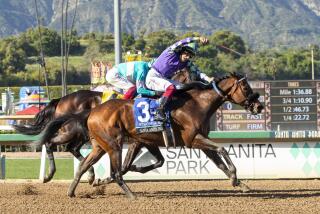French Horses Always Seem to Find Way
- Share via
Racing fans at Laurel, Md. this weekend may feel confused as they try to handicap races with horses from all over the world. But when they are in doubt, they might employ a system that has worked with deadly accuracy this year:
Bet any horse who has recently stepped off a plane from France.
Shippers from France have enjoyed spectacular success in major grass stakes from coast to coast:
-- Pay the Butler came from Paris to New York and scored a 13-to-1 upset in Belmont’s first important grass stakes of the season, the Red Smith Handicap.
-- Pay the Butler was upset in his next start, the Grade I Bowling Green Handicap, by Coeur de Lion -- who had just arrived from France.
--Mill Native, a Grade III performer in France, won this continent’s second-richest turf race, the Arlington Million, at odds of 40 to 1, in August.
-- Two weeks ago, Nasr el Arab came from France and overpowered the field in one of California’s premier grass events, the Oak Tree Invitational.
Why have the French been able to achieve such great international success?
It is no secret that most of the world’s best grass runners are based in England and France. Turf is their only game. Many of America’s most gifted thoroughbreds -- Alysheba, for example -- are never even tested to see if they would like grass. So Europe’s best horses would figure to beat U.S. turf runners who generally are not are top-class horses.
Moreover, the competition in England and France is so fierce that horses who come here with nothing but Grade III stakes credentials are still apt to be very, very good. In America, there are many tracks at which a horse can win a graded stake by finding a weak five-horse field, but there are few such soft spots abroad. Stakes typically draw big fields with representatives from most of the country’s major stables.
But for all of the high quality of English racing, horses from England have had much less of an international impact than those from France. The reason is fairly clear: the French are much more aggressive about shipping their horses around the world, and they have mastered the nuances of international racing.
Barry Weisbord, the president of Matchmaker International, recruits foreign horses for Laurel’s Turf Festival and other stakes in this country, and he regularly sees how different the attitudes are in the two countries: “The leading French trainers -- Francois Boutin, Alec Head, Robert Collet -- are very sophisticated and they understand how to find a spot for a horse. Look at what Collet did last year with Le Glorieux -- sending him to Germany to win stakes and then to this country to win the International. And success like this encourages other guys to try.
More to Read
Sign up for The Wild
We’ll help you find the best places to hike, bike and run, as well as the perfect silent spots for meditation and yoga.
You may occasionally receive promotional content from the Los Angeles Times.






